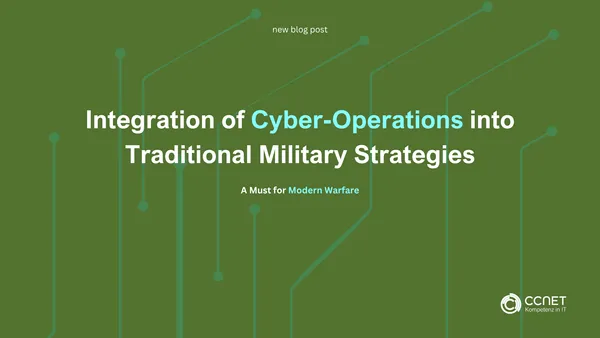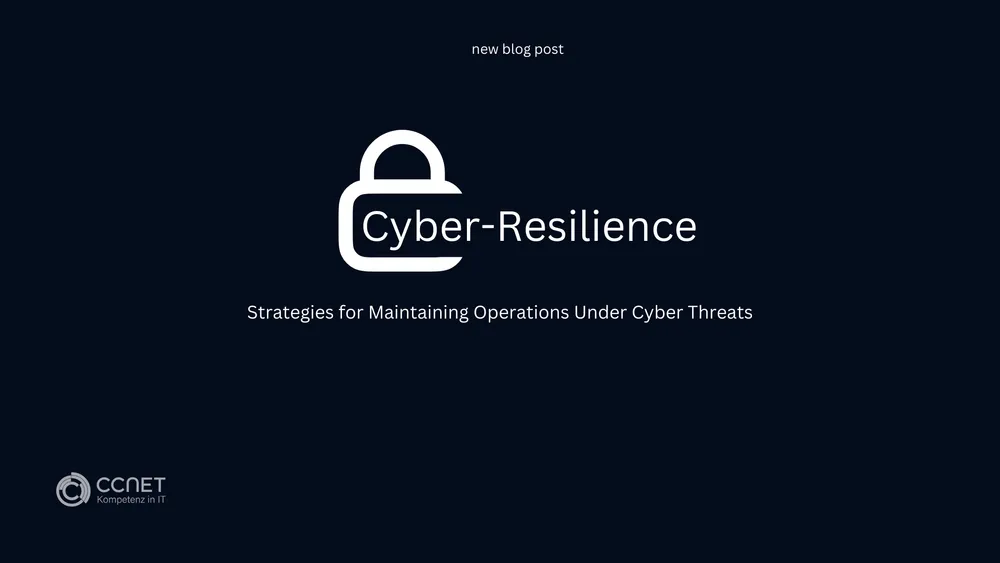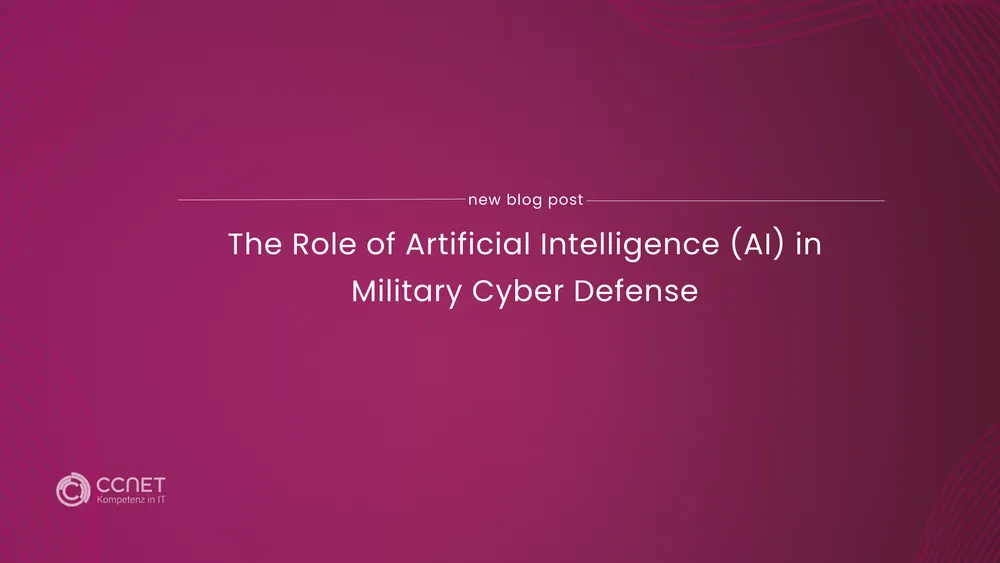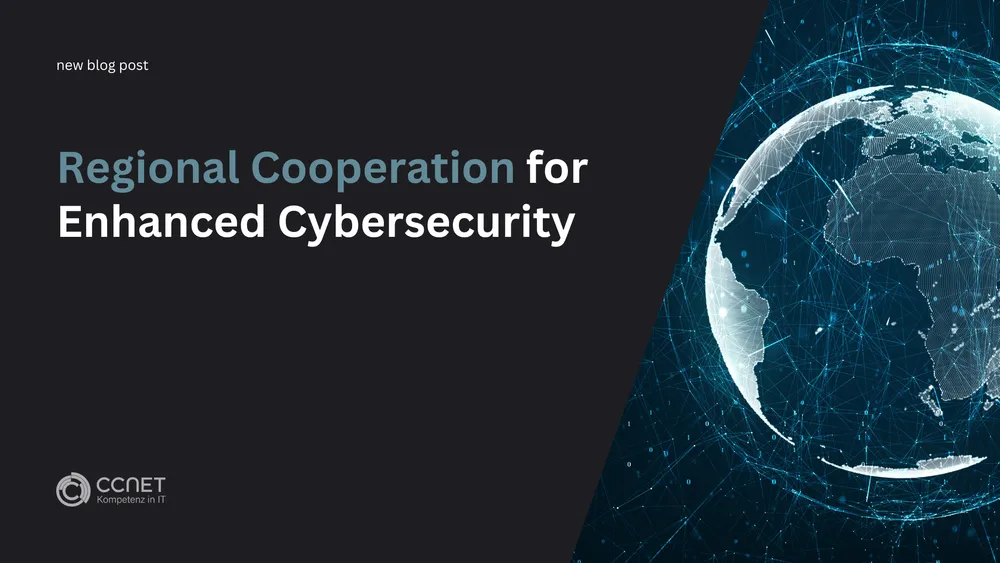
CCNet
Feb 17, 2025 • 4 min read

Integrating cyber operations into traditional military strategies: a must for modern warfare
With the increasing digital connectivity, cyber operations have become a key element in modern military strategies. The ability to seamlessly integrate cyber operations into traditional military actions is essential for addressing contemporary threats and maximizing the effectiveness of military operations. This blog post explores the importance and challenges of integrating cyber operations into traditional military strategies, offering insights into best practices for successful integration.
The Role of Cyber Operations in Modern Warfare
Cyber operations have evolved from a supportive element to a core component of military strategy. They play a critical role in the preparation and execution of military operations by disrupting enemy communication, crippling critical infrastructure, and ensuring information superiority. In many modern conflicts, cyber operations are the first phase of an attack, paving the way for conventional military actions.
Cyber operations offer unique advantages not found in traditional military strategies. They allow for the disruption or destabilization of adversaries from a distance, without the need to deploy physical troops. This can lead to significant strategic advantages, particularly when it comes to gaining control over information flows and communication networks. Through cyber operations, military forces can greatly enhance their ability to monitor and control the battlefield situation, providing them with a decisive advantage over their opponents.
Challenges of Integrating Cyber Operations
Despite the obvious benefits, there are significant challenges when integrating cyber operations into traditional military strategies. One of the biggest challenges lies in the different nature of cyber operations compared to conventional military actions. While conventional operations often focus on physical targets and clear rules of engagement, cyber operations are often more complex and require a deep understanding of digital infrastructure, as well as the ability to operate in a dynamic and often invisible environment.
Another challenge is the coordination between cyber operations and traditional military units. In many cases, cyber units operate in isolated environments, making coordination with other military units difficult. This can lead to delays, misunderstandings, and ineffective operations. The challenge is to ensure that cyber operations are coordinated in real-time with conventional military actions to maximize efficiency.
The integration also requires adjustments to military doctrines and training programs. Traditional military doctrines are often insufficient to address the unique aspects of cyber operations. Therefore, it is necessary to develop new doctrines that recognize cyber operations as an integral part of military strategy. These doctrines should provide guidelines for planning, executing, and evaluating cyber operations in combination with traditional military actions.
Strategies for Successful Integration of Cyber Operations
To successfully integrate cyber operations into traditional military strategies, several approaches are needed:
-
Development of Integrated Doctrines: Military organizations must develop new doctrines that clearly define the role of cyber operations in the overall strategy. These doctrines should include specific instructions on how to coordinate cyber operations with conventional units, ensuring that cyber capabilities are considered in all phases of military operations.
-
Training and Education: Training military personnel at all levels is crucial to ensure they understand the importance of cyber operations and are capable of using them effectively. This includes training cyber specialists as well as traditional military units on how to handle cyber threats and collaborate with cyber units.
-
Deployment of Real-Time Coordination Technologies: Integrating cyber operations requires technologies that enable real-time coordination between various units. These technologies should ensure that cyber and conventional operations are synchronized and mutually supportive.
-
Development of Scenarios and Exercises: Military organizations should regularly develop scenarios and conduct exercises that simulate the integration of cyber operations into traditional military strategies. These exercises help test interoperability, identify weaknesses, and assess the effectiveness of integration.
Future Perspectives on Cyber Integration in Military Strategies
As digitalization advances and the significance of cyberspace in military conflicts grows, the integration of cyber operations into traditional military strategies will continue to increase in importance. States that can effectively implement this integration will have a significant strategic advantage in future conflicts. Continually adapting military strategies and doctrines to evolving cyber threats and technologies will be key to maintaining this advantage.
Conclusion
The integration of cyber operations into traditional military strategies is essential for modern warfare. By combining the capabilities and resources of both domains, military organizations can significantly enhance their effectiveness and better respond to the complex threats of the 21st century. Despite the challenges, successful integration of cyber operations offers substantial strategic advantages that can significantly influence the outcome of conflicts.
Contact us for more information
Why is the integration of cyber operations into military strategies necessary?
Cyber operations enable the control of information flows, disruption of enemy systems, and enhancement of the effectiveness of traditional military missions. Their integration significantly boosts the strategic impact and responsiveness of modern armed forces.
What role do cyber operations play in modern warfare?
Cyber operations often represent the first phase of military conflicts. They serve purposes such as reconnaissance, sabotage, and disinformation—often before physical units are deployed.
What are the biggest challenges in integrating cyber operations into traditional military strategies?
Differences in planning, speed, and transparency between digital and conventional operations make coordination difficult. Additionally, a lack of established doctrines and the need for technical interoperability complicate integration.
How can military doctrines be adapted to cyber operations?
Doctrines must treat cyberattacks as equal tools of warfare. This includes specific guidelines for planning, decision-making, collaboration with physical units, and evaluating the effects on civilian infrastructure.
How can coordination between cyber and conventional units be improved?
Through real-time communication tools, standardized protocols, and joint operations centers, coordination and synchronization between cyber, ground, air, or naval operations can be significantly enhanced.
What training is required for successful cyber integration in the armed forces?
Beyond technical training for cyber units, conventional units must also be aware of digital threats. Training on cyber tactics, threat identification, and IT security is necessary at all levels.
Which technologies support the integration of cyber operations?
Technologies such as secure communication networks, networked command-and-control systems (C4ISR), and AI-supported situational awareness tools enhance coordination between digital and analog combat components.
Which countries are leaders in integrating cyber operations?
Countries such as the USA, Israel, China, and Russia are considered pioneers in developing integrated cyber-military strategies. NATO members are also increasingly working on joint doctrines for cyber warfare.
How can the success of integrated cyber strategies be measured?
Success is measured by the ability to effectively disrupt enemy communications, influence decision-making processes, and maintain the resilience of one's own systems—all while minimizing escalation risks.
Will cyber warfare eventually replace conventional warfare?
No—but it will significantly complement it. The hybrid warfare of the future relies on close integration of digital and physical means.


